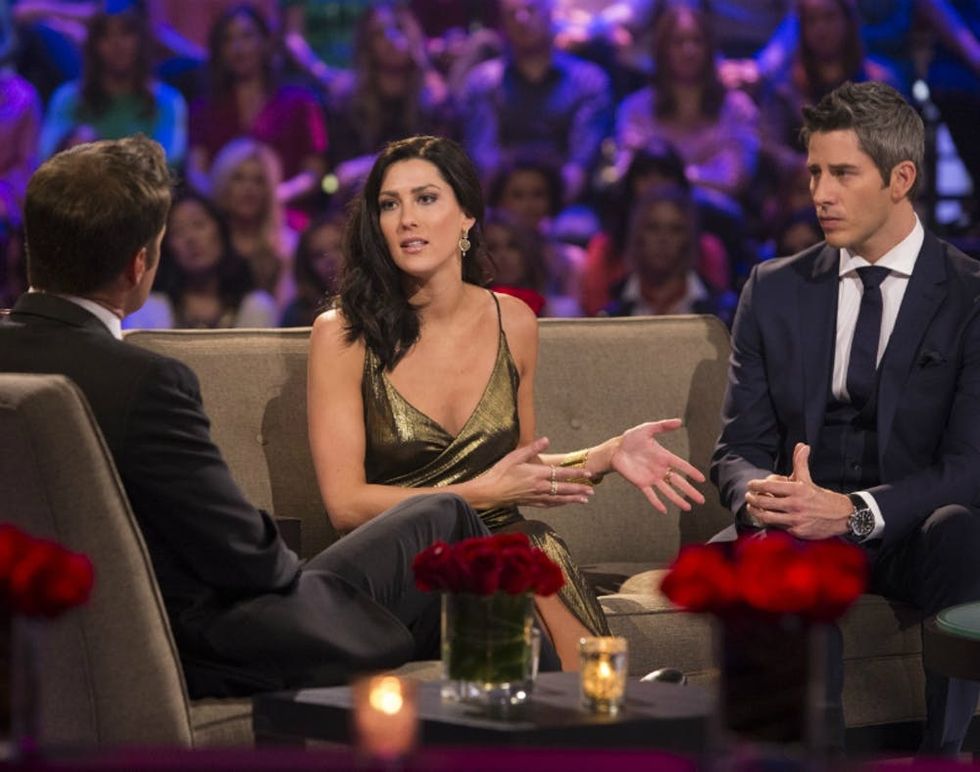‘Bachelor Nation’ Author Amy Kaufman on Why It’s Totally Okay to Love ‘The Bachelor’

There are multiple pitfalls that come with binge-watching an entire season of The Bachelor. First, the hour-and-half-long episodes (plus the most recent season’s three-hour finale) require a huge investment of time. So many hours are spent voyeuristically looking in on (and judging) the dating strategies of total strangers that the show can slide into your dreams. The other danger — even if you’re the kind of person who views this pop cultural juggernaut with an initial mix of boredom and horror — is that by about the fourth or fifth episode, you’re going to find yourself invested in the outcome, and social media spoilers are lurking around every corner.
Finally, there’s the looming self-doubt attached to this specific brand of guilty pleasure: Is it possible to enjoy watching 25 women compete for a marriage proposal from one man (be he a middling race car driver or a winemaker or the team captain of his varsity track team) and still call yourself a feminist?

In the era of #MeToo and #TimesUp and Forever 21 t-shirts emblazoned with the F-word (we mean “feminist”), we asked Amy Kaufman, devout Bachelor fan dating back to the Jason Mesnick era and the author of Bachelor Nation: Inside The World of America’s Guilty Pleasure, if we could “steal her for a second” to try to figure out why we’re so obsessed — and why that’s totally okay.
According to Kaufman’s research, The Bachelor’s main viewer demo is “Young women… who are college-educated and have managerial positions.” Read: smart, cool women who have their sh*t together. And they/we aren’t mindlessly watching the show. Kaufman and the (famous) Bach fans she interviews go deep into the exercise of introspection about their reason for tuning in season after season (22 in all, not counting the various spinoffs).
“I clearly had a lot of feelings about why I watched and why I was so sucked in,” she says. “I felt sort of guilty about watching it and so it led me done the path of this entire weird book.”
B+C: From the very first episode, the women vying for the affections of The Bachelor seem devastated when they don’t get a rose — like, some of them talk about how they’ve let down their families or how they felt so confident about themselves until they saw all the other women. That in particular, makes it feel like the show is less about “finding love” and more about “winning,” especially when we get to the hometowns which are like quarterfinal playoffs — do you have thoughts on that?
Amy Kaufman: I saw [former Bachelorette] Kaitlyn Bristowe tweet something in response to that kind of question: Why do they get so upset; they don’t even know this guy? They aren’t just upset over the guy. They left their job, they might have given up their apartment, they are away from all their family and friends, and now they’re going to look like a loser on national television. There’s a lot more that goes into that than just feeling like they’ve lost [latest Bachelor] Arie, the douchey race car driver. I think those are good points that at least made me think, “Okay, I get why this is a tough thing to go through.”
B+C: Other than the rotating cast, have you picked up on any big, important changes in the show over the course of that many seasons, especially in terms of the way we watch it and how Instagram has changed our access to these people?
AK: Yeah, you’ll see Mike Fleiss, the creator, or Rob Mills who’s an ABC executive, and Chris Harrison, the host, interact with people on Twitter. Basically, the formula is that at the end of an episode there’s a Rose Ceremony where we see who is sent home and then you start fresh the next week. Then they started doing cliffhangers where they were not doing the Rose Ceremony at the end of the episode — they’d like, save it for the next week. Viewers sort of rebelled against that and so Mike Fleiss and the others would write on Twitter, ‘We heard you, Bachelor Nation! We’re changing the Rose Ceremony! We listen to you!’ So they’re responsive somewhat to what the audience wants. And of course, when it comes to picking the lead, that has a lot to do with it too. I think Nick Viall really has his entire Bachelor career to thank social media for.
In terms of how the show has evolved more broadly, when the show started, the Bachelor was the prototypical “desirable” guy — he was Harvard or Stanford-educated, he was from an affluent Connecticut suburb, he was monied and pedigreed. Now, he’s a “nice guy” who might sell software or medical devices and goes to church every Sunday — which I also think is a reflection of how the dating culture has changed. In some ways I like that because it’s not all about checking off boxes, but on the other hand, I’m like, ‘Are we settling?’ Like, the show is about offering a desirable guy, so I at least think he should have a job.
B+C: Yes, this season the women were way too good for Arie Luyendyk.
AK: I agree! Like with Sienne, even he was like, “She went to Yale; I worked at Pizza Hut.” I don’t think he went to college. He was definitely insecure about that.
B+C: For people who haven’t seen the show, they might be surprised to find out that the women who sign up to do this are pretty likable and accomplished.
AK: I did an event with Becca Tilley, a former Bachelor contestant, and she was kind of insulted by some of the celebrities in the book who said that they like to watch the show and make fun of the contestants and feel like they’re better than them. She was like, ‘Isn’t that kind of anti-feminist?’ I sort of agree in some ways. You’re sitting there watching it, so clearly you find something alluring about this premise. You might not actually be doing it, but if you’re tuning in, there’s something about it that’s fascinating or interesting… For all of us who think we’re better than someone who would go on reality TV, I don’t know that we’re all that different.

B+C: For your book, Josh Molina told you that the show feeds his snark and cynicism while at the same time offering up hope in the form of this tiny sliver of a chance at true love. We’d bet that a lot of viewers feel that way.
AK: I think everyone who is cynical and snarky deep down is kind of a softy. I’m speaking as someone who’s that way. As a snarky person, it’s easier for me to be like, “Ew, why would you want that? That girl’s dumb.” Because to say you want it is scarier and makes you more vulnerable.
B+C: Your book is called Bachelor Nation: Inside the World of America’s Favorite Guilty Pleasure. Guilty pleasures are often pretty self-contained, but Bachelor fans will go online and tweet messages of support and/or vitriol toward contestants days and even weeks later. What do you think it is that’s special or unique to The Bachelor to inspire that kind of emotional investment?
AK: I guess it feels like we could be this girl. Despite all the things working against me, even I imagined going on the show because, while they get to go on outlandish dates, it’s not like the scenarios are that different. We can all imagine being in love or falling in love. We can compare our relationships to the ones that they’re going through on some level. That just ratchets up the judgment level, too. Like, “I would never do that” or “That’s not how I’d behave” or “That’s not what men want.” Because we think we know, we get a little more judgey.
B+C: The show premiered in 2002 and it feels like — especially in the last 18 months or so — we’ve made these leaps forward in terms of calling out gender inequality in all its dark hiding places. That makes the fact that nearly eight million people tuned in to watch the most recent finale a bit puzzling. Is there a thing the show is giving us that we can’t get elsewhere? It seems like something beyond just simple escapism.
AK: You can’t underestimate the intensity of the stories we’ve been told about love and romance since we were young women. The fairy tales we read in books, the Disney movies we watched, the romantic comedies we watched. All that stuff is in our brains whether we would like it to be or not. That’s why we see so many women on the show saying “I want to meet my Prince Charming.”
So many of my friends are career-first, not marriage-first. So there’s almost something shameful about admitting “I want to get married. That’s my priority.” That’s why we look down our noses at the people on the show who go on and say that this is what they want and that they’d move somewhere else for it and they’re going to put their job on hold for it. I think subconsciously we really want that just as much as the people who are open about it on the show — not all of us, but more of us than we’d care to admit. The other thing is, as a feminist, you’re allowed to want love and romance and fantasy. The two aren’t mutually exclusive, obviously.
B+C: Last thing: How do you feel about watching smart, beautiful women get rejected on TV? Are you in the “See, we all get rejected!” camp or the “Oh dear lord, if that perfect person can’t find love, neither will I” camp?
AK: I’m more like “Everyone gets rejected!” and “They weren’t a good match.” I do think the [latter] is a viewpoint that a lot of us have, but I don’t like that perspective because it gives the man more of the power. I get it; it’s so hard to find a partner and it’s overwhelming, but it’s a two-way street.
Is The Bachelor one of your guilty (or not so guilty) TV pleasures? Let us know on Twitter.
(Photos via Paul Hebert/ABC)

















